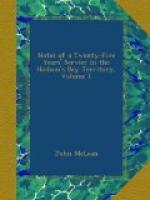Like the Esquimaux and Carriers, they seem to have had no idea of religion prior to the settlement of Europeans among them; all the terms they at present use in reference to the subject seem of recent origin, and invented by the interpreters. They name the Deity, “Ya ga ta-that-hee-hee,”—“The Man who reclines on the sky;” angels are called “the birds of the Deity,”—“ya gat he-be e Yadze;” the devil, “Ha is linee,” or, “the sorcerer.”
The Slaves and Rabbitskins have also their magicians, whom alone they fear and reverence. Polygamy is not common, yet there are instances of one man having two female masters. In times of famine the cravings of hunger often drive these poor Indians to desperation, when the feelings of humanity and of nature seem utterly eradicated.
During the fearful distress of the two past years, a band of Slaves came to Fort Simpson in a condition not to be described. Many of them had perished by the way; but the history of one family is the most shocking I ever heard. The husband first destroyed the wife, and packed her up as provision for the journey. The supply proving insufficient, one of the children was next sacrificed. The cannibal was finally left by the party he accompanied with only one child remaining—a boy of seven or eight years of age. Mr. Lewis immediately despatched two men with some pemmican, to meet him; the aid came too late,—they found the monster roasting a part of his last child at the fire. Horrified at the sight, they uttered not a word, but threw the provisions into the encampment, and retreated as fast as they could. A few days afterwards this brute arrived strong and hearty, and appeared as unconcerned as if all had gone on well with him and his family. Cannibalism is more frequently known among the Slaves and Rabbitskins than any other of the kindred tribes; and it is said that women are generally the perpetrators of the crime; it is also said, that when once they have tasted of this unhallowed food they prefer it to every other.
All the Chippewayan tribes dispose of their dead by placing them in tombs made of wood, and sufficiently strong to resist the attacks of wild beasts. The body is laid in the tomb at full length, without any particular direction being observed as to the head or feet. Neither they, nor any other Indians I am acquainted with, place their dead in a sitting posture.
It is affirmed by some writers that the Indians have a tradition among them of the migration of their progenitors from east to west. I have had every opportunity of investigating the question, and able interpreters wherever I wintered; but I never could learn that any such tradition existed. Even in their tales and legends there is never any reference to a distant land; when questioned in regard to this, their invariable answer is, “Our fathers and our fathers’ fathers have hunted on these lands ever since the flood, and we never heard of any other country till the whites came among us.” These tribes have the same tradition in regard to the flood, that I heard among the Algonquins at the gates of Montreal, some trifling incidents excepted.




